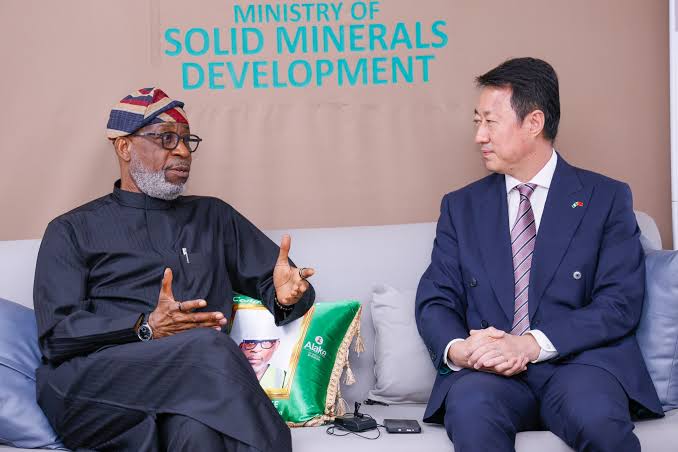The Federal Government of Nigeria has reaffirmed its commitment to transform the country’s economy by focusing on the mining and automotive industries as major drivers of industrial development. This was disclosed during a strategic meeting in Abuja between the Minister of State for Industry, Trade and Investment, Senator John Owan Enoh, and the Director-General of the Nigeria-China Strategic Partnership, Mr. Joseph Tegbe.
The meeting, which focused on aligning development priorities, was part of broader efforts to support President Bola Ahmed Tinubu’s Renewed Hope Agenda, which aims to reposition Nigeria from an import-reliant economy to a self-sufficient, export-driven nation. The agenda targets key productive sectors to unlock industrial potential and create millions of jobs for Nigerians.
In his remarks, Senator Enoh noted that the government is concentrating on three priority sectors to boost local production and reduce dependency on imports. These include the sugar industry, the cotton-textile-garment value chain, and the automotive sector. According to the minister, dedicated industry councils are already in place to coordinate efforts and drive industrial growth in each of these areas.
He also pointed to the “Nigeria First Policy,” a presidential directive that mandates all government Ministries, Departments, and Agencies (MDAs) to give preference to Nigerian-made goods and services in public procurement. Enoh explained that this policy is gradually restructuring public sector procurement, building local capacity, and creating new economic opportunities for Nigerian producers and manufacturers.
Speaking during the meeting, Mr. Joseph Tegbe pledged the full support of the Nigeria-China Strategic Partnership towards realising Nigeria’s industrial goals. He said the partnership is ready to work with both public and private sector players to shift the country from being a consumer economy to becoming a key development partner to China and the rest of the world.
Tegbe drew a comparison with Brazil’s performance in 2024, where the South American country exported goods worth over $94 billion to China. He said Nigeria has the potential to replicate such success, especially if it properly harnesses its agricultural resources, solid minerals, and industrial manufacturing capacity.
On the mining sector, he stressed that Nigeria is sitting on over 40 commercially viable mineral resources which could serve as building blocks for a strong industrial base. He emphasized that the time has come to stop the raw export of these minerals and instead focus on developing local industries for beneficiation, processing, and refining. This, he said, would create value, generate revenue, and support technological advancement.
Tegbe also highlighted ongoing government reforms through the Industrial Revolution Working Groups, an initiative under the Presidential Council on Industrial Revitalisation. These groups are addressing key challenges in the industrial sector, such as regulatory bottlenecks, inadequate infrastructure, and limited financing for manufacturers and miners.
In the automotive sector, government efforts are already yielding some results. Senator Enoh noted that policies are in place to make Nigeria a regional hub for vehicle assembly and manufacturing. The goal is not just to assemble cars, but to build a full automotive industry that includes spare parts production, local workforce development, and integration into the global value chain.
The Nigeria First Policy, according to him, is also playing a critical role in this process. The demand for locally assembled vehicles is growing as government MDAs and corporate buyers respond to the call to patronize Made-in-Nigeria products. Investors are beginning to show renewed interest, and several automobile firms have already committed to local production.
The national automotive policy is also looking beyond traditional vehicles, with plans to move into electric and energy-efficient mobility. This will position Nigeria at the forefront of innovation in West Africa and ensure environmental sustainability as part of its industrial transformation.
Tegbe concluded by saying that the Nigeria-China Strategic Partnership will continue to work closely with the government to ensure that both the mining and automotive sectors contribute meaningfully to job creation, foreign exchange earnings, and sustainable national development.
